Every month, we pick a few topics for exploration. The topics we select aren’t meant to cover every issue area facing the progressive community, but rather to give actionable advice on how to talk about key issue areas. This month we focused on:
How can progressives make an affirmative argument in favor of bold changes in economic policy?
When making the case for bold economic change, progressives should not feel the need to pit incrementalism against more transformative policies. Instead, they can win the debate by reminding Americans why change is needed in the first place: despite recent economic gains at the top, the economy is not producing real prosperity in which everyone benefits.
President Trump’s recent decision-making on Iran has escalated concerns at home and abroad about American safety. What worries Americans most?
Americans are concerned about war with Iran and other consequences of Trump’s foreign policy strategy. Progressives should emphasize his recklessness and make clear his recent foreign policy decisions could make us less safe.
The Senate has begun its impeachment trial of President Trump. How can progressives continue to make the case for impeachment in this new stage of proceedings?
A majority of the American public continues to support impeachment – including the removal of Trump from office. Emphasizing the facts of the case while criticizing Republicans on procedural unfairness are key to continuing to bolster support.
Making an Affirmative Argument for Economic Change
Most Americans have a positive view of the U.S. economy overall, but the public is split on Trump’s handling and see him as looking out for those at the top.
While most Americans rate the economy as either “good” or “excellent” (62%), positive sentiment about the economy does not translate to clear approval for Trump’s economic policies or satisfaction with the way things are going in the country today. The public remains evenly split over how Trump is handling the economy (48% approve/48% disapprove), and though his ratings on the economy over-perform his overall approval (43%), 56% agree that the president should make changes to his economic policies (just 32% say he should continue with the same policies). When it comes to who the public trusts more to handle important kitchen table issues, Americans continue to give Democrats in Congress an edge over the president. This is true particularly on health care, where Democrats in Congress have a 23-point lead over President Trump (56% to 33%), and taxes, where Democrats lead Trump in trust, 47% to 40%. Even when it comes to handling “the economy” itself, trust is a virtual tie between Democrats (46%) and President Trump (44%).
One long standing critique of the president is his policies put wealthy people first rather than working and middle class people, a view with which 58% of the public agrees (43% strongly). Moreover, greater shares of the public trust Democrats in Congress more than the president on looking out for people who work for a living (52% to 38%), improving wages for American workers (51% to 39%), and creating an economy where workers can thrive (47% to 43%). Similarly, while Americans overwhelmingly believe Trump’s actions and policies on the economy have been positive for big corporations (71%) and wealthy people (70%), far fewer constituents believe his policies have been positive for people in the middle class (40%) or “people like you” (34%). The only issue tested where Trump performs better: creating an economy where businesses can thrive, where he is more trusted by a 7-point margin.
The case for progressives is clear: the public has an appetite for economic change. Trump’s actions have been good for those at the top, but not so much for everyone else.
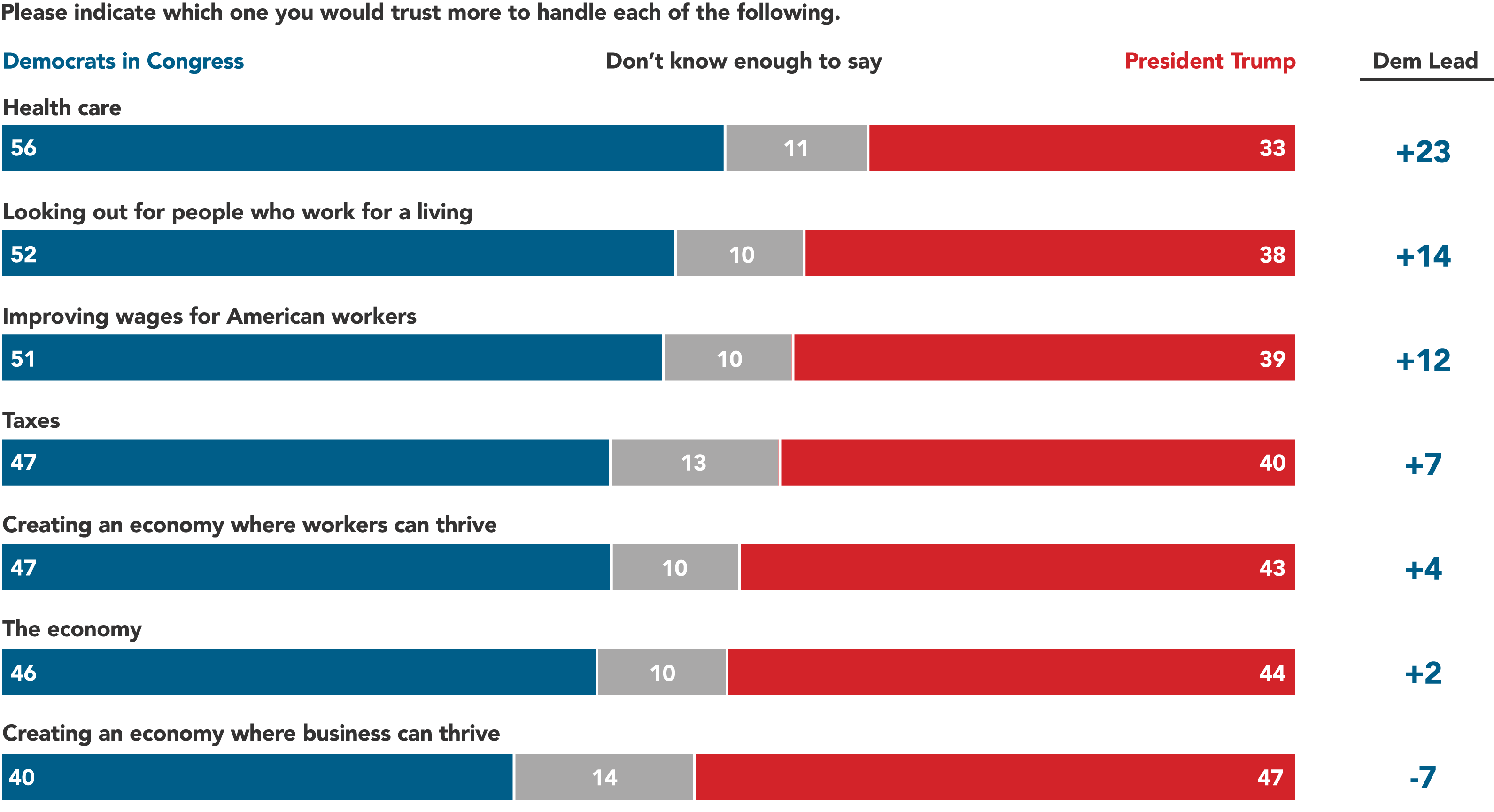
For progressives advocating in favor of bold economic change, it is important to emphasize the big-picture problems plaguing our economy preventing everyday Americans from getting ahead. When the core of progressive economic arguments fail to address the structural challenges facing regular people, conservative counter- arguments easily prevail, and gain traction even among progressive base groups such as African Americans and Hispanics. However, when highlighting the inequities and disparities faced in the economy, progressive arguments prevail over conservative framings.
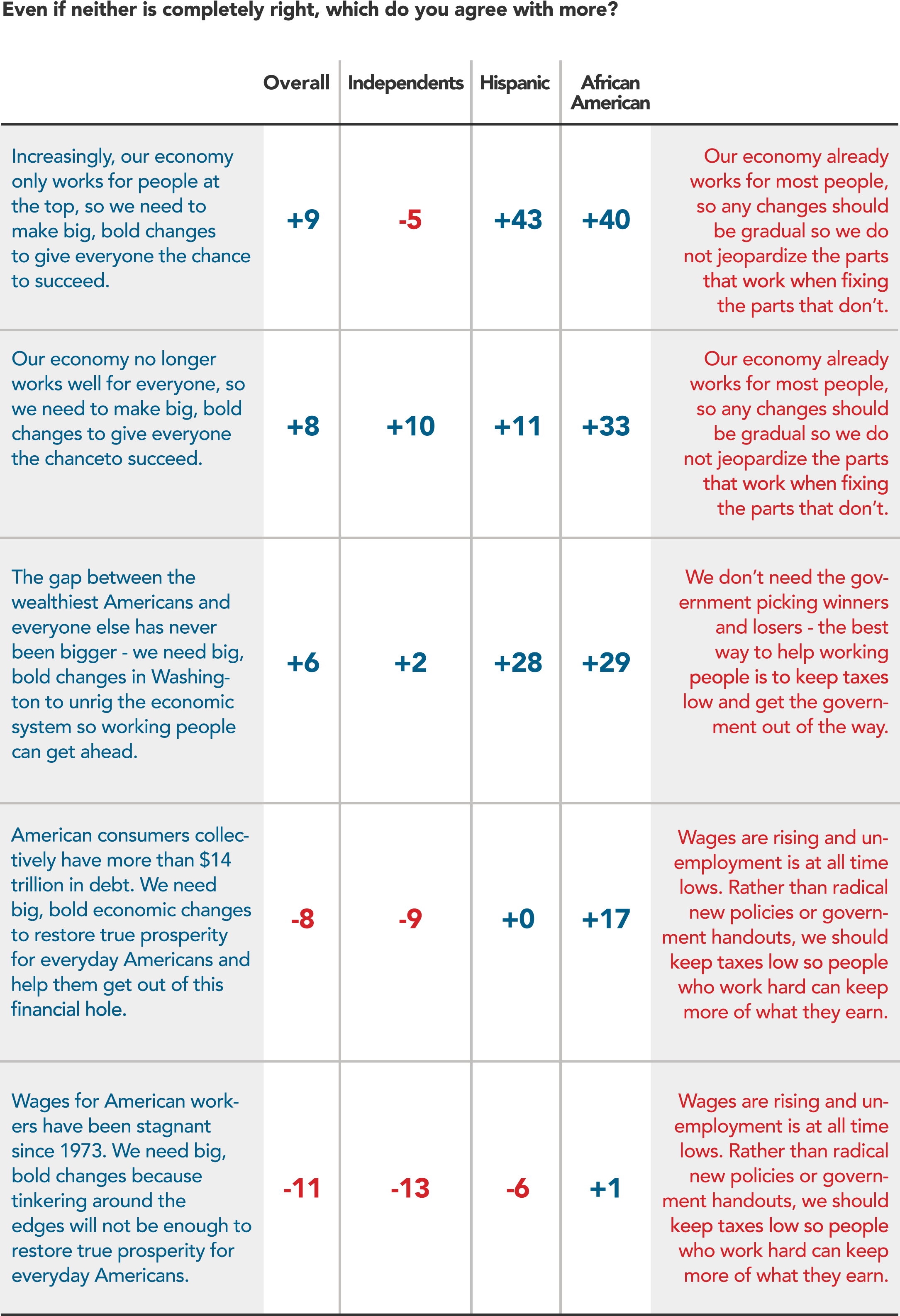
Progressives should avoid framing change as antagonistic to finding “common ground.”
It is often the case that people feel they’re forced to choose between doing the right thing and finding “common ground.” Navigator confirms that when forced to choose, Americans favor the idea of advancing economic changes most people can agree on, rather than advancing big ideas even if some people disagree (52% to 35%). But the findings detailed on the next page show that “bold” doesn’t have to be the opposite of “popular,” and that in fact, many of the “bold” changes for which progressives are known to advocate happen to be ideas on which most people agree.
Progressives should be sure to characterize — accurately — their ideas for bold, structural change as being widely popular across partisan lines, and should not allow their vision to be characterized as being antithetical to the wishes of most Americans.
Progressives should make an affirmative argument for how to move the economy forward.
One thing is clear when it comes to the economic debate: progressives should not frame their economic argument over whether credit for today’s economy should go to President Trump or to former President Obama. Rather, Americans are more compelled by the need to address structural economic challenges in spite of broad optimism, which significantly beats back a conservative argument giving Trump credit for a booming economy.
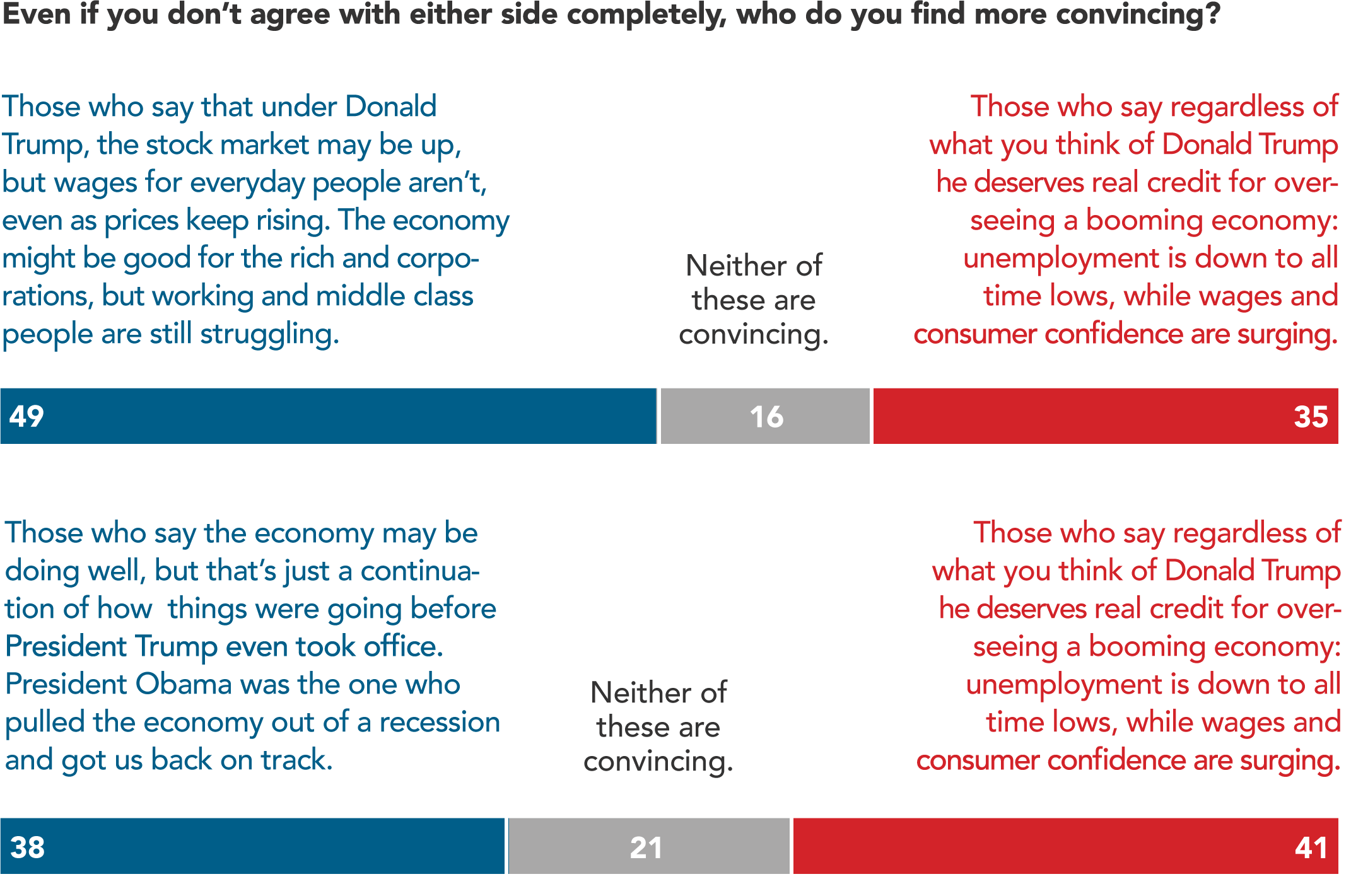
Progressives can lean into frames that champion change over going back to normal.
There could be crossover appeal to framing progressive ideas as a departure from the old normal in Washington. An argument asserting big, bold changes as necessary because “the old normal in Washington wasn’t working” bests a counter of “going back to normal” by 10 points, including among independents who favor it by 15 points and Republicans who favor the argument by 19 points. Democrats evenly split between the two points of view (45% to 45%).
Evaluating Progressive Economic Policy Proposals
Many progressive policy ideas have broad support among the American public and are most likely to be associated with words like “necessary” and “ambitious.”
Navigator explored public sentiment in two different ways for a variety of different proposals that would represent bold, progressive economic change: asking about support for each of the policies, and also asking which words from a pre-selected list respondents would associate with each.
Navigator found overall majority support (between 56% and 79%) for each of the proposals tested, including majority or plurality support for each proposal among pure independents. While some proposals draw support from majorities among all partisan affiliations, others – such as Medicare-for-All – have a more limited appeal. The important takeaway is that many progressive policy proposals already carry broad public support.
The word association exercise adds texture for how the public contextualizes these kinds of proposals, and how polarized those associations are along partisan lines. For example, the five proposals with the greatest net support each had very positive associations, with the top three words most likely to be “necessary,” “ambitious,” and “exciting.” While the remaining policies tested also have net positive support, more negative associations entered into the top choices of respondents, particularly “unrealistic” and “unaffordable” (which were the most common associations among Republicans). “Necessary” was the one word that ranked as the top association among Democrats for each proposal asked about in this survey.
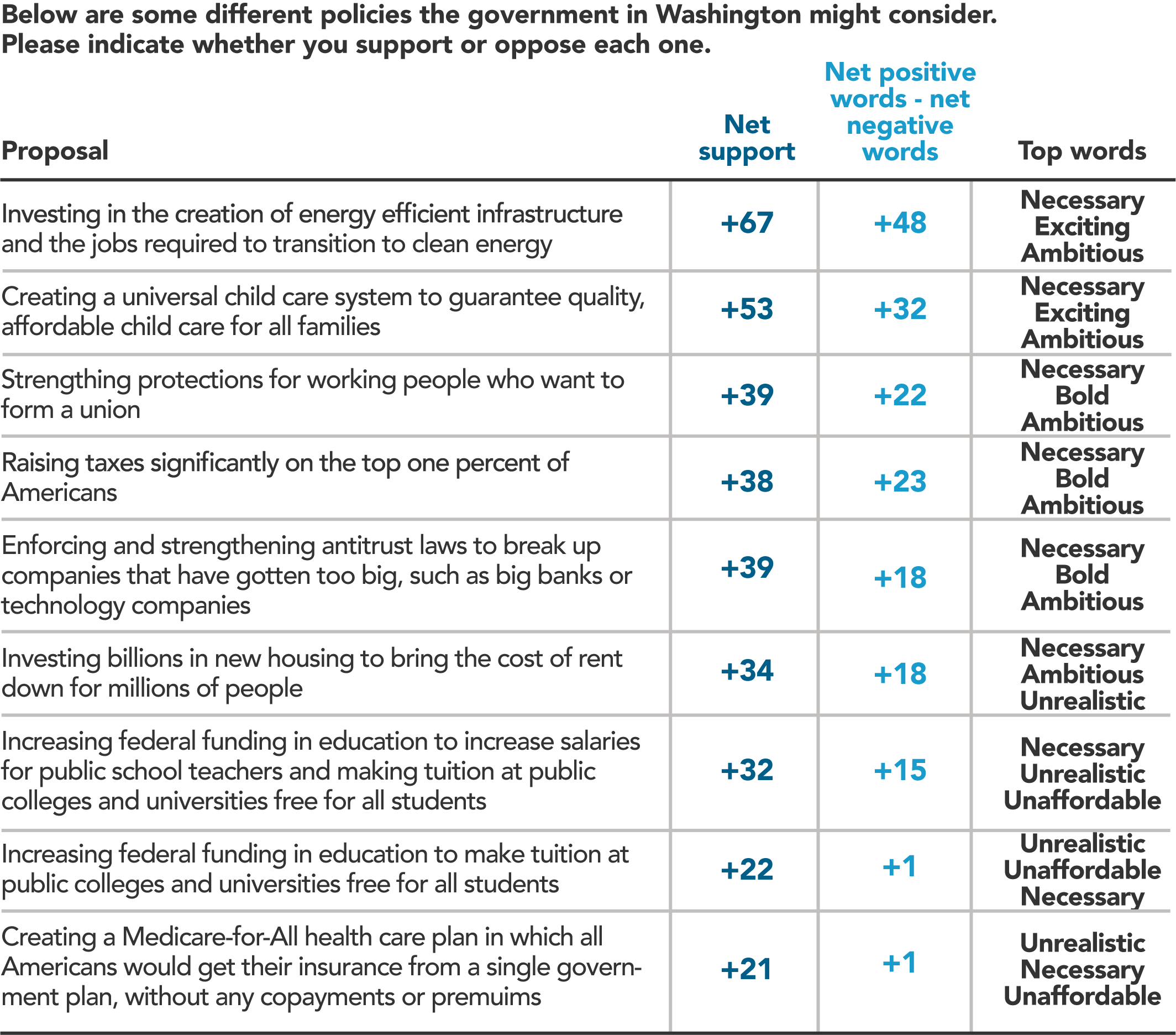
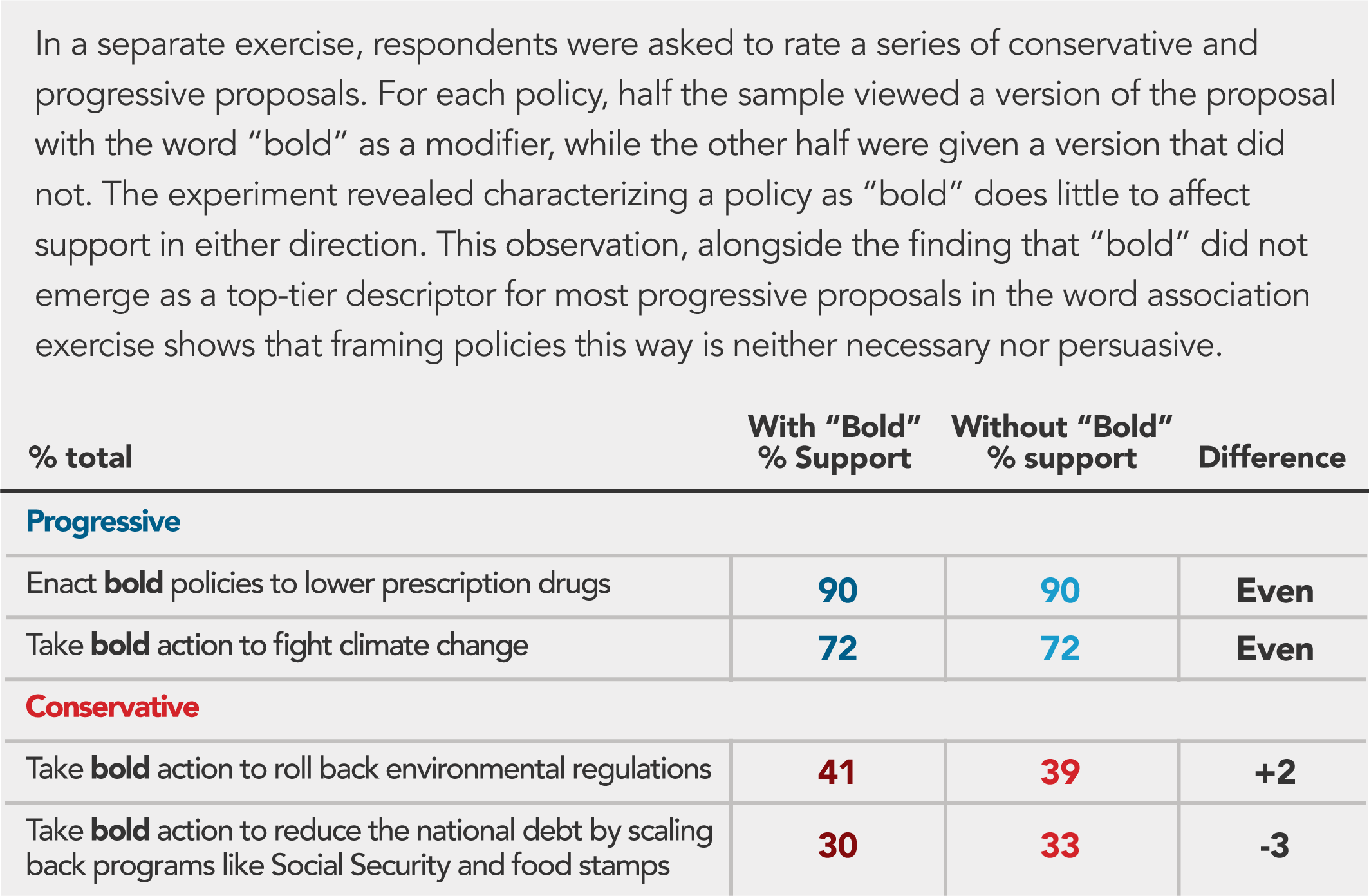
Trump’s Iran Problem
Progressives have the opportunity to step apart from Trump on security, safety and stability after the latest with Iran.
Americans are concerned about the changing role of America in the world and Trump’s handling of foreign policy. Tensions between Iran and the United States have escalated under Trump, starting with America’s withdrawal from the 2015 nuclear deal. In recent weeks, Trump ordered an airstrike killing Iranian military commander Qassem Soleimani, inspiring Iranian retaliation in a missile strike on two bases hosting American and coalition troops in Iraq. The events led to widespread criticism of Trump’s handling of foreign policy, with a bipartisan coalition of senators moving to limit his war powers.
Our latest survey finds:
- A majority of Americans disapprove of the way Donald Trump is handling foreign policy (42% approve/51% disapprove), including nearly half of independents (37% approve/49% disapprove).
- Moreover, 67% of Americans, including 62% of independents, are concerned by the way foreign policy and America’s role in the world are changing under Trump.
This offers progressives an opportunity to speak to these concerns and provide an alternative approach to Trump’s foreign policy in the form of a return to normalcy.
Americans aren’t as concerned about the Soleimani airstrike itself as they are about the future impact of his actions, including the possibility of war with Iran.
Trump’s approval ratings on his handling of Iran are underwater (43% approve/49% disapprove) while support for the airstrike that killed Soleimani is higher, though still mixed (48% support/40% oppose). A plurality of independents (47%) favor the decision, with 28% opposed, and another 25% unsure.
However, Americans are both worried about and opposed to war with Iran – sentiment that transcends partisanship. When it comes to Iran specifically, Americans are more concerned (42%) than not (30%) about the potential of the United States getting into a war with Iran in the next year, and the vast majority (70%) oppose such a conflict. These numbers hold among independents, with 56% concerned about a potential war with Iran and 66% opposed. Highlighting the increased likelihood of war with Iran is a powerful mechanism to persuade independents that Trump’s approach is both reckless and dangerous.
Increasing possibility of a deeply unpopular war.
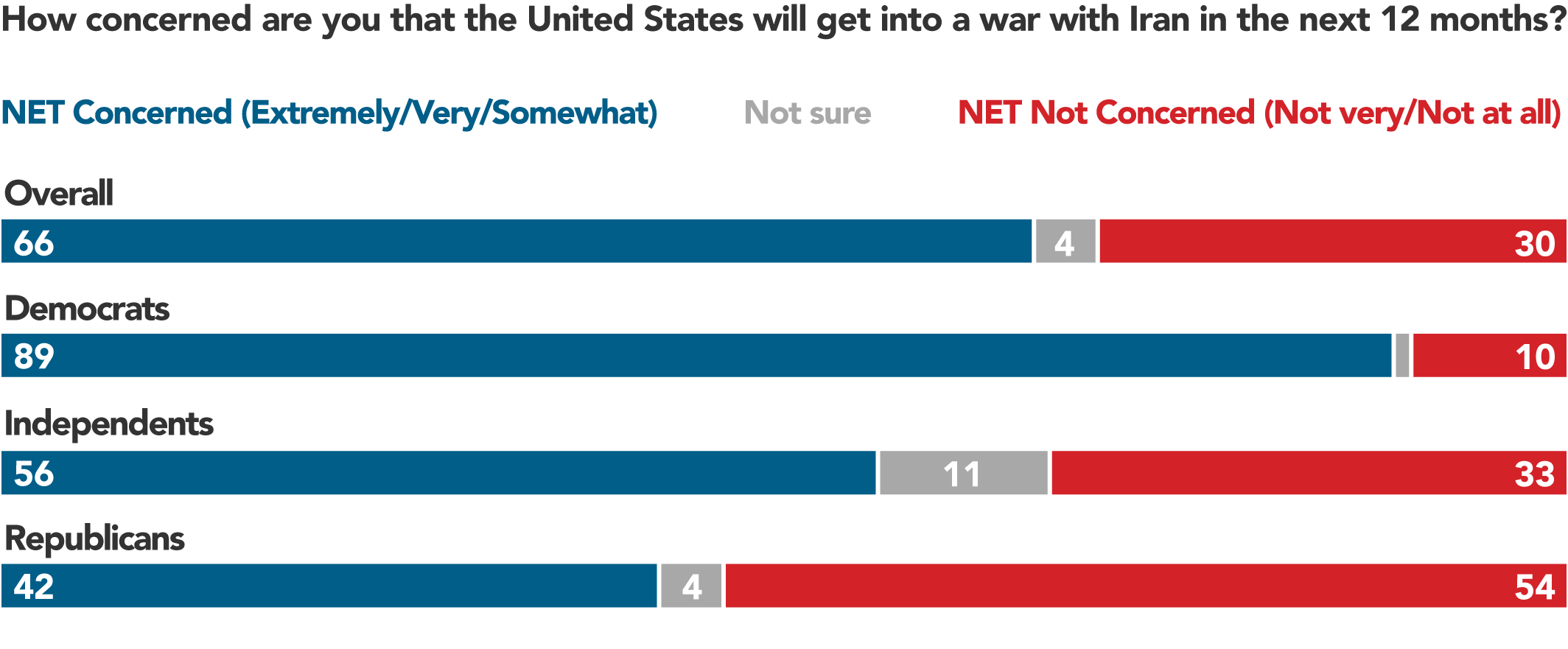
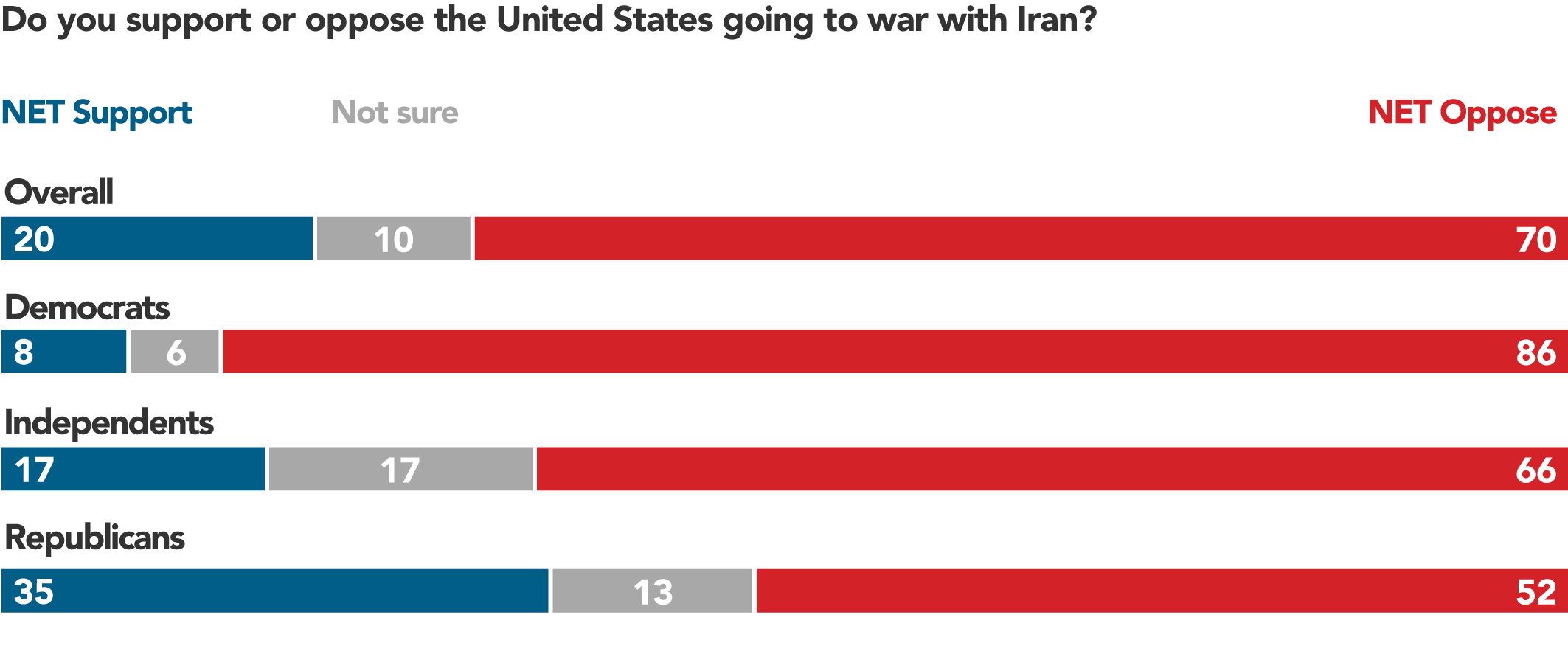
Communicate about what the airstrike could lead to in the future and how it makes Americans less safe.
Progressives can make the case that Trump’s decision-making in Iran has made war and nuclear proliferation more likely, and that Americans are less safe because of it. Americans’ worries about Trump’s actions extend beyond prolonged military conflict with Iran. Full-scale war with Iran is certainly among the public’s top concerns (57% believe it is now more likely), but Americans are just as worried about the increased likelihood of attacks on diplomats abroad (56% say more likely), terrorist attacks in the United States (55%), and of Iran building nuclear weapons (53%). Opponents of Trump’s approach to foreign policy can benefit from highlighting the breadth of these fears, especially among independents, to help make the progressive case that Trump’s escalation of tensions is endangering Americans at home and abroad.
Trump’s handling of Iran is increasing Americans’ concerns about dangerous consequences.
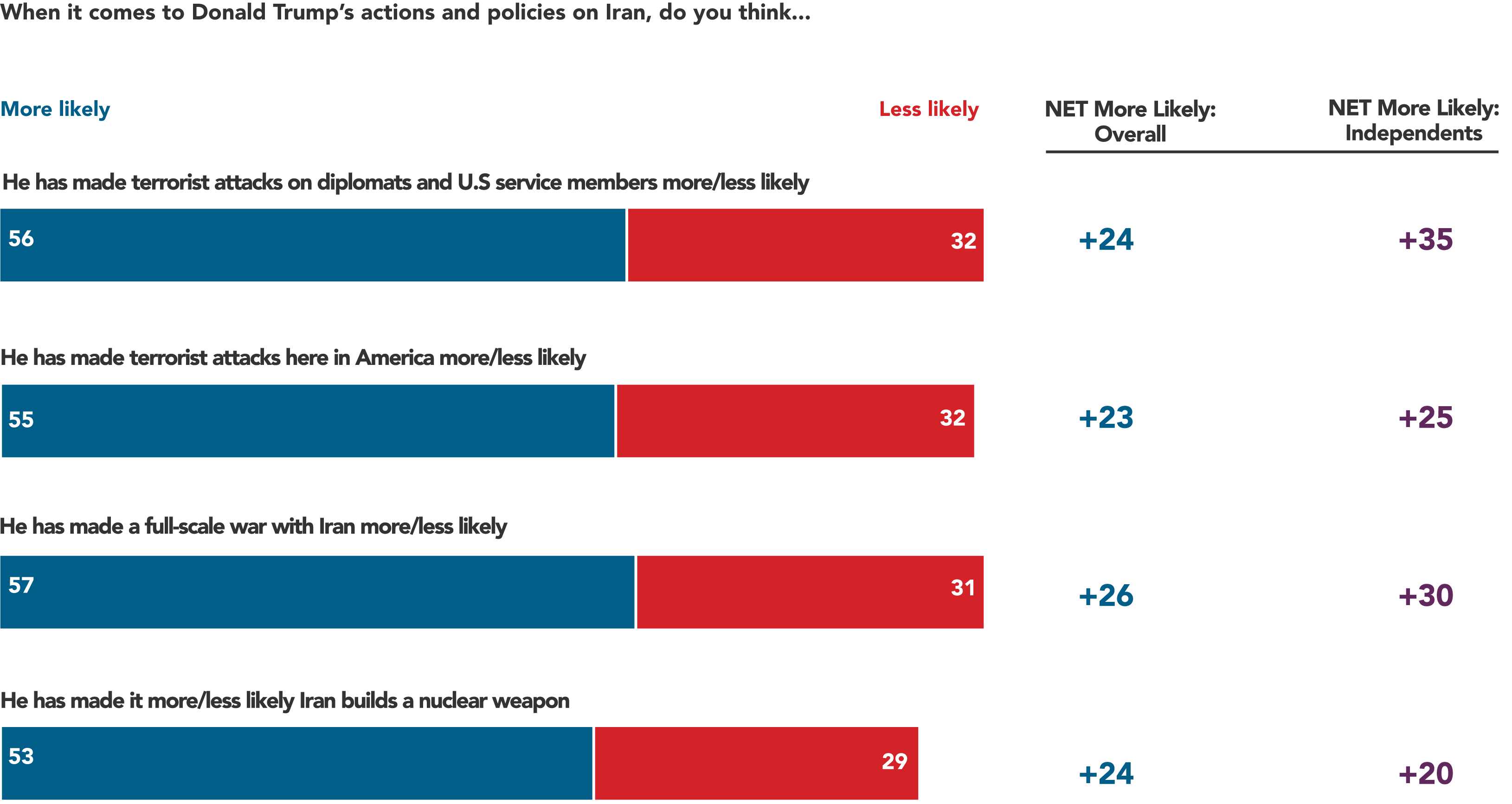
Reminding people of “recklessness” in Trump’s approach to foreign policy decision-making connects his actions to concrete policy ramifications.
On matters of foreign policy, the public is more likely to view Democrats approach as thoughtful, while Trump and the Republicans are more likely to be perceived as reckless. In a series of foreign policy tracking questions previously asked in November 2019, respondents were asked to rate a list of important values in foreign policy as being more applicable to Democrats or to President Trump and Republicans. Democrats continue to hold an advantage over Trump and Republicans on most measures:
- By clear margins, Democrats are more likely to be seen as “thoughtful” (+17, up from +14 in November) and “a good partner to U.S. allies” (+11).
- Americans are more likely to make negative associations like playing “political games” when thinking about Trump and the Republicans’ approach to foreign policy.
- Progressives need to work on translating these advantages to public safety as the public is more mixed about who is “focused on keeping America safe.”
Progressives can benefit from the perception of their measured, thoughtful approach to foreign policy strategy in contrast to the perceived volatility of Trump. Connecting this to the possible outcomes of conflict associated with Trump’s foreign policy approach could help make the case against Trump’s handling of Iran and foreign policy at large.
Progressives can emphasize thoughtfulness, partnership to American allies, responsibility, and avoidance of partisan games.
Below is a series of words and phrases that could describe the two parties and President Trump when it comes to foreign policy and national security issues. For each, please indicate who you think the description applies to better if you absolutely had to choose one.
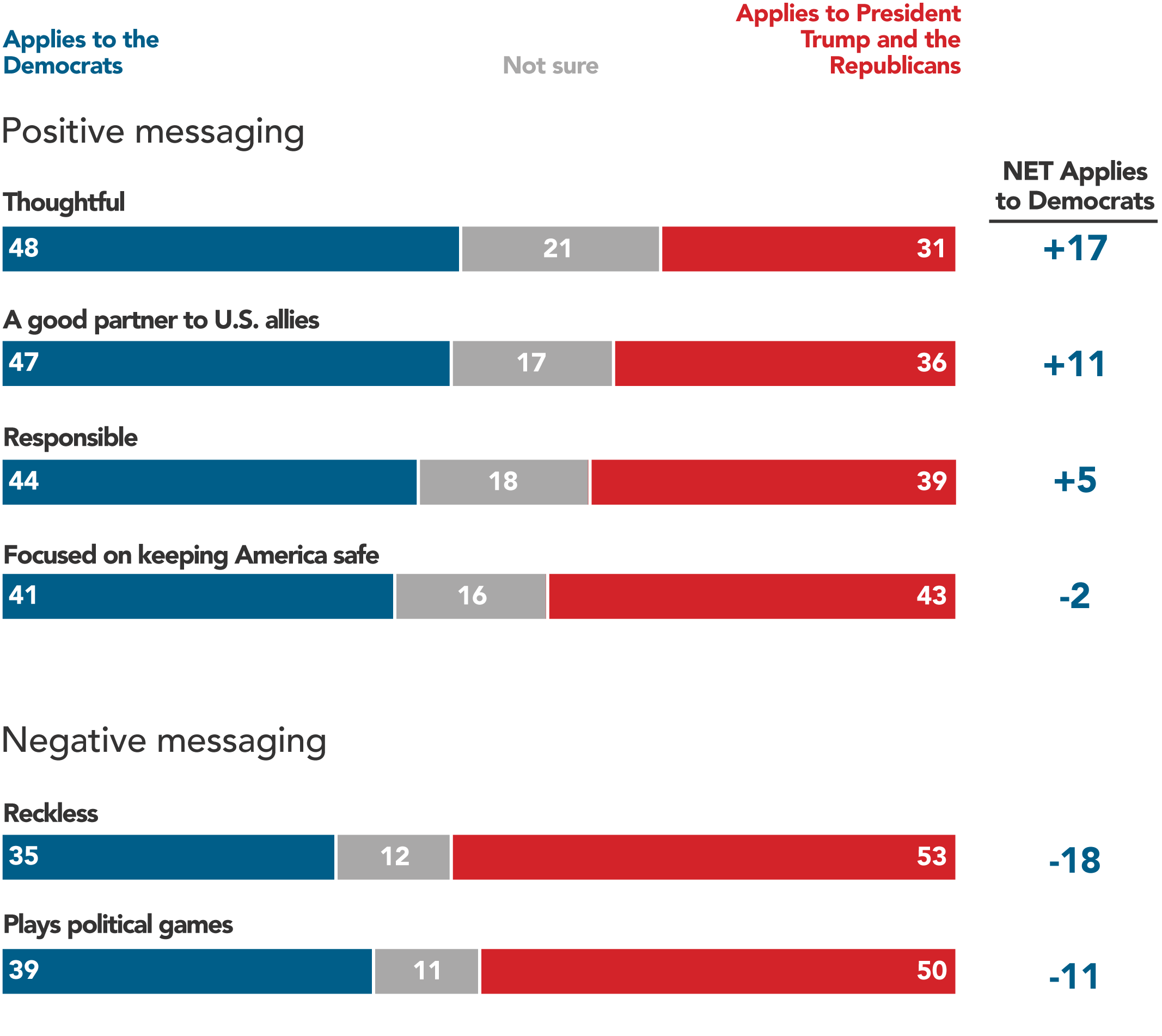
Impeachment Support Remains Steady
Majority support for impeachment remains unchanged after House vote, as does support for progressive case and trust in Democratic investigators.
Following the transition to a public trial in the Senate, majority support for impeachment and removal from office has held steady. Overall, 51% of Americans support impeachment and removing Trump from office, while 43% oppose. This falls in line with our previous survey in December, which had the exact same result.
Regardless of where they are on impeachment, a majority of Americans (58%) continue to believe that Trump has committed a crime while serving as president, while 35% don’t think he has. This has held steady since December, when 57% of Americans said they believe he has committed a crime while in office, and 35% said they don’t. In addition, Americans trust Democrats in Congress over President Trump on the issue of “the rule of law” by 14 points, 48% to 34%.
Further, on the core impeachment debate, public opinion is on the side of Democrats: The public supports a full trial over a short trial. When asked whether they prefer a full trial with evidence and witnesses giving new testimony before a Senate vote on removal, versus a short proceeding that states the charges and goes to a Senate vote on removal, Americans prefer the full trial (57% new witnesses and evidence/30% short proceeding). A plurality of independents also prefer a full trial (45% new witnesses and evidence/28% short proceeding).
In addition to new witnesses, Americans are largely opposed to Mitch McConnell moving the impeachment trial forward without hearing new evidence (35% approve/51% disapprove). Opposition is also strong among independents (28% approve/46% disapprove).
These measures remain favorable for progressives, demonstrating sustained approval for Democrats’ role throughout the impeachment process thus far.
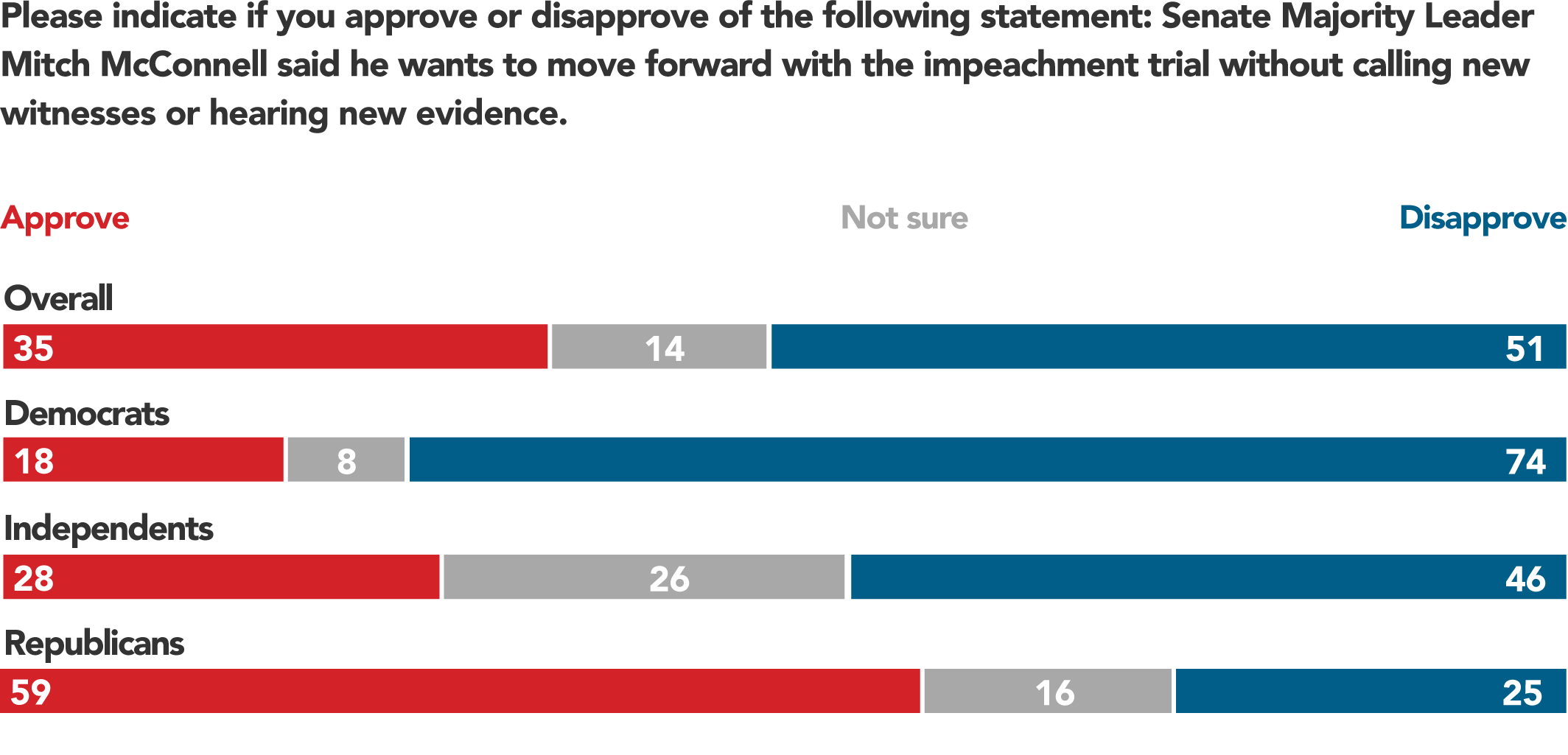
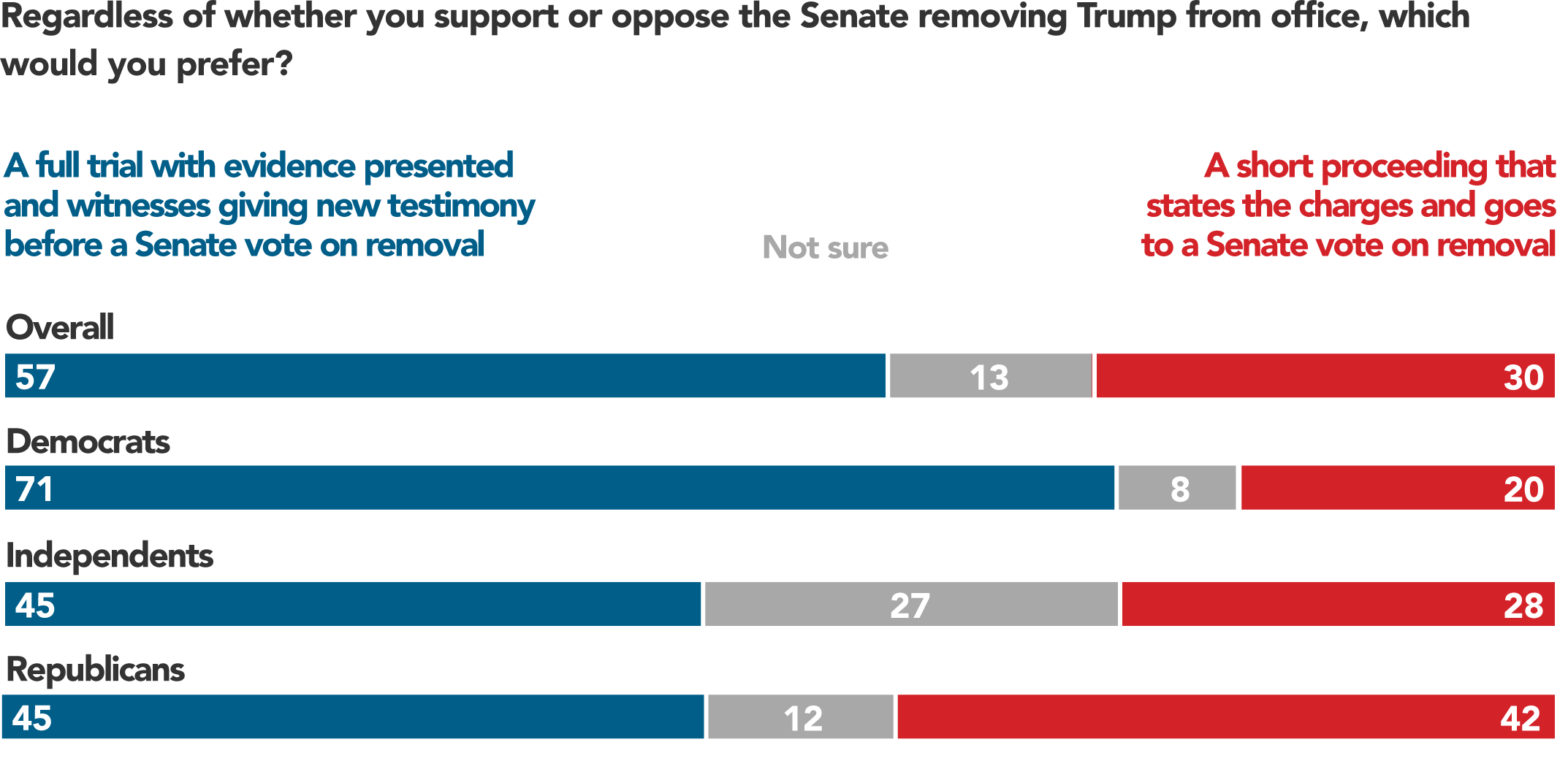
Two tasks for supporters of impeachment: Lean into Democrats’ advantage on the structure of the Senate trial, and elevate the importance of new witnesses like John Bolton willing to testify.
Task #1: Continue to win in the court of public opinion by calling out the Republican process as unfair or a cover up.
Following the conclusion of the House’s inquiry, more Americans believe that impeachment has been fair (47%) than unfair (40%) and trust Nancy Pelosi (40%) more than Mitch McConnell (33%) when it comes to impeachment.
As the impeachment process has transitioned into the Senate trial, Americans disapprove of how Republicans are handling the process (35% approve/51% disapprove) while they are more likely to approve of how Democrats are handling impeachment (46% approve/46% disapprove). Among the 51% of Americans who disapprove of Mc- Connell not calling new witnesses or hearing new evidence, an “unfair trial” (43%) and “cover up” (44%) were the best ways to describe why they opposed McConnell’s stance. Highlighting these criticisms of Republicans in failing to permit new evidence and witnesses into the Senate trial, and describing it as “unfair” and a “sham,” resonates with both Americans overall and specifically independents.
Task #2: Don’t assume John Bolton is a household name.
Only 48% of Americans are familiar with John Bolton, and only 47% of Americans say they have heard about his willingness to comply with a subpoena to testify in the Senate impeachment trial. However, 82% of Americans found it important he testify once they learn more about his role in the case. This includes 77% of independents and 70% of Republicans, indicating widespread support across party lines for Bolton’s testimony.
To make the case for the removal of Trump from office, focus on the advantages Democrats continue to sustain on structure and perceived fairness in the impeachment process. Taking advantage of the fact that Americans prefer a trial with new evidence and witnesses over a trial with an immediate movement to vote without new evidence or witnesses, while elevating specific new witnesses like John Bolton, can help progressives strengthen their case.
Note: this survey was fielded before news that Bolton wrote potentially damaging information in a draft of his forthcoming book.
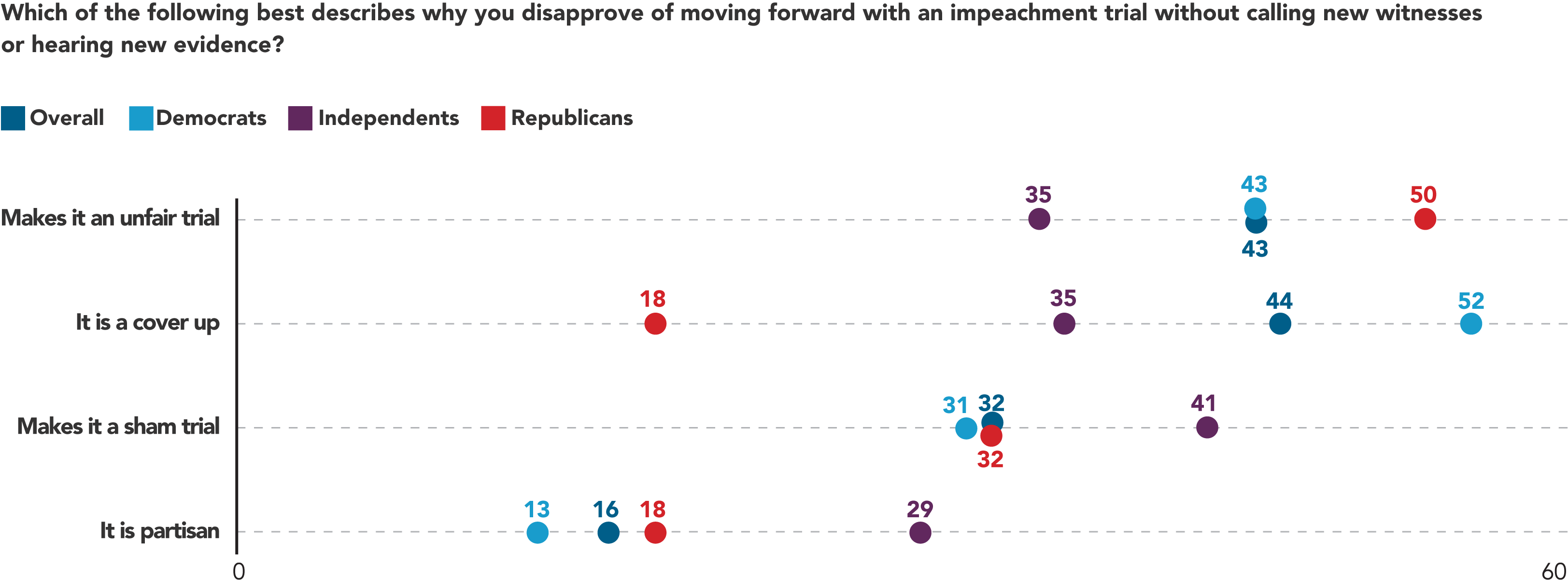
Bonus Points
The Republican tax law continues to lack support and few have felt a positive impact.
- Navigator has tracked support for the Republican tax law since it was enacted in December 2017 and continues to find opinion toward it is net negative (35% support/39% oppose).
- Only 18% of Americans characterize the law as having improved their personal finances, while 20% say it’s made them worse and 62% either say it has had no impact or they are unsure. Even among Republicans, only 35% believe it has had a positive impact.
Progressives can broaden support for federal investment in education when pairing increasing teacher salaries alongside making public colleges tuition-free.
- While tuition-free college garners strong support by itself, proposing funding for education to invest in that alongside improving public school teacher salaries gets a notable net 10-point lift in support from the public.

About The Study
Global Strategy Group conducted a public opinion survey among a sample of 1,000 registered voters conducted January 17-21, 2020. 200 additional interviews were conducted among political independents with no partisan lean, 100 additional interviews were conducted among African Americans, and 100 additional interviews were conducted among non-white Hispanics. The survey was conducted online, recruiting respondents from multiple opt-in online panel vendors. Respondents were verified against a voter file and special care was taken to ensure the demographic composition of our sample matched that of the national registered voter population across a variety of demographic variables.

